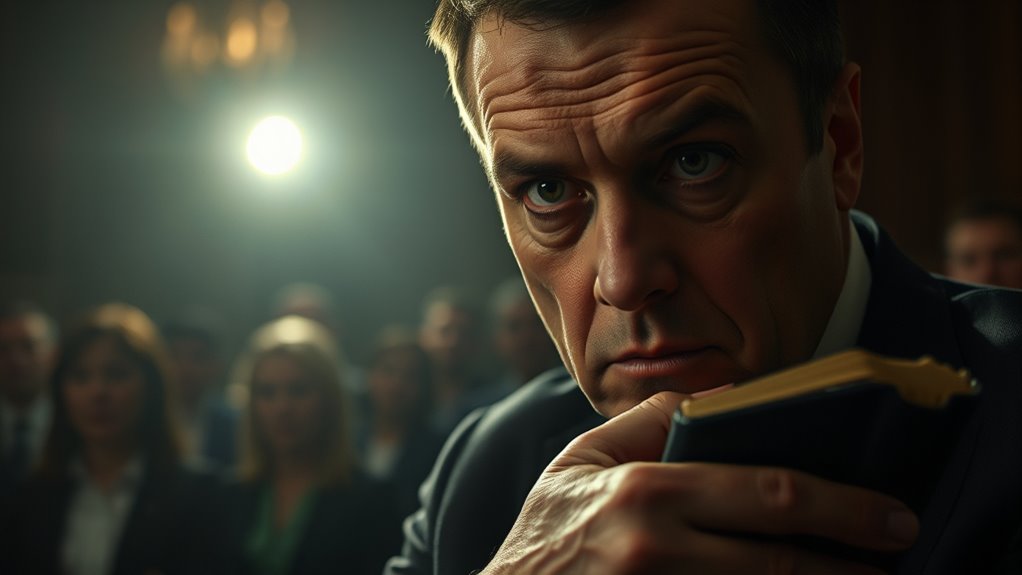In the 1981 “Devil Made Me Do It” trial, Arne Johnson claimed demonic possession as a legal defense for murder, challenging traditional accountability. The defense argued that evil spirits overpowered Johnson’s free will, pushing him to commit the crime. However, the court relied on psychiatric evidence instead of supernatural explanations, and Johnson was ultimately convicted. This case raises intriguing questions about how courts handle supernatural beliefs—if you want to explore more, there’s much to uncover.
Key Takeaways
- The trial involved Arne Johnson, who claimed demonic possession as a defense for his murder committed in 1981.
- Johnson’s defense argued that a demon possessed him, influencing his actions and absolving personal responsibility.
- The court ultimately rejected demonic possession as a legal defense, relying instead on psychiatric evaluations.
- The case sparked debate over supernatural claims within the legal system and the boundaries of insanity defenses.
- It remains a notable example of the conflict between supernatural beliefs and legal standards in criminal responsibility.

The “Devil Made Me Do It” trial captured widespread attention when defendant David Glatzel’s defense claimed demonic possession as a key factor in his actions. This case brought to the forefront the question of whether supernatural influences could be used as a legal defense, challenging the boundaries of traditional notions of legal insanity. You might find it shocking to think that, during a court trial, the defense argued that demonic possession overpowered Glatzel’s free will, rendering him not fully responsible for his behavior. This assertion raises complex issues about mental health, supernatural beliefs, and the law’s capacity to address such claims.
Demonic possession as a legal defense challenges traditional notions of responsibility and mental health in court.
In this context, demonic possession isn’t just a religious or cultural concept; it becomes a legal argument. The defense posited that Glatzel was under the influence of malevolent spirits, which impaired his ability to distinguish right from wrong. The concept of legal insanity typically hinges on whether a person could understand the nature of their actions or conform to the law at the time of the crime. Here, the defense argued that demonic possession essentially stripped Glatzel of his mental agency, similar to how mental illness might be used to justify a not guilty by reason of insanity plea. However, the court had to determine whether such a supernatural explanation could be recognized within the legal system, which normally relies on psychiatric evaluations and scientific evidence. Additionally, the case challenged the legal system’s understanding of psychological and supernatural factors, raising questions about how such influences should be evaluated.
As the trial unfolded, it challenged the court’s understanding of mental health by introducing supernatural elements into a legal setting. You might wonder how the judge and jury approached this claim—did they see it as a genuine defense or as a desperate attempt to avoid responsibility? Ultimately, the court did not accept demonic possession as a valid legal defense, but the case ignited debates about the boundaries of insanity defenses. It forced legal professionals to grapple with questions about whether belief in demonic influence could ever be considered equivalent to mental illness or whether it remains outside the scope of legal insanity.
This case reminds you that the law often struggles to adapt to extraordinary claims. While demonic possession isn’t recognized as a scientific or psychiatric condition, its use in court highlights the tension between supernatural beliefs and the legal standards of responsibility. The trial symbolized a clash between traditional notions of accountability and supernatural explanations, prompting ongoing discussions about how the law should interpret claims rooted in religious or cultural beliefs.
Frequently Asked Questions
What Was the Defendant’s Background Before the Trial?
You might find that understanding the defendant’s background helps explain their psychology and how it influenced the defense strategy. Before the trial, Johnson had a troubled history with mental health issues and substance abuse, which the defense team argued impacted his perception and actions. This background was essential in shaping their strategy to present him as influenced by external forces, aiming to sway the jury’s perception of his intent and responsibility.
How Did the Court Evaluate the Demon Possession Defense?
Imagine the courtroom as a battleground where the demon defense was put under a microscope. The court evaluated this unusual plea by examining expert testimonies and evidence, ultimately finding the demon defense unconvincing. They saw it as an attempt to mask responsibility rather than a legitimate legal argument. So, in their courtroom evaluation, they dismissed the demon defense, emphasizing personal accountability over supernatural influence.
Were There Any Notable Witnesses or Expert Testimonies?
You’d find that the trial featured notable witnesses and expert testimonies related to the exorcism controversy, which influenced the legal implications. Experts debated whether demon possession could be a valid defense, and witnesses recounted disturbing events linked to the exorcism. These testimonies shaped the court’s view on the defendant’s mental state and highlighted the complex intersection of supernatural claims and legal standards, making the case particularly controversial.
What Impact Did the Trial Have on Legal Precedent?
You see, the trial’s impact on legal precedent is profound; it challenges the boundaries of the demon defense and raises questions about mental health and responsibility. While some see it as a groundbreaking case, others view it as a step back in legal standards. Its influence sparks debates on how supernatural claims are considered in court, ultimately shaping future legal implications and prompting courts to clarify the limits of such defenses.
How Did Public Opinion Influence the Case Outcome?
Public perception and media influence played a significant role in shaping the case outcome. As you follow the trial, you notice how media coverage sways public opinion, creating a sense of skepticism or belief about the defendant’s claims. This media influence pressures the legal system and jurors, affecting their decisions. Ultimately, public perception becomes a powerful force, guiding the case’s direction and influencing the verdict, even beyond the evidence presented.
Conclusion
As you reflect on Arne Johnson’s infamous case, you realize that belief and blame blur boundaries. The devil’s deceit and doubt drive decisions, daring you to discern darkness from duty. This trial tests trust, urging you to understand that sometimes, the line between right and wrong is dangerously thin. Remember, in life’s labyrinth, your choices carry consequences, and clarity can be clouded by chaos. Be vigilant, for your voice and values truly define your destiny.









